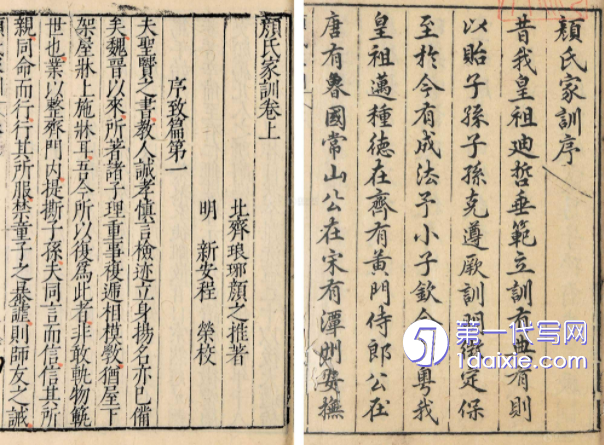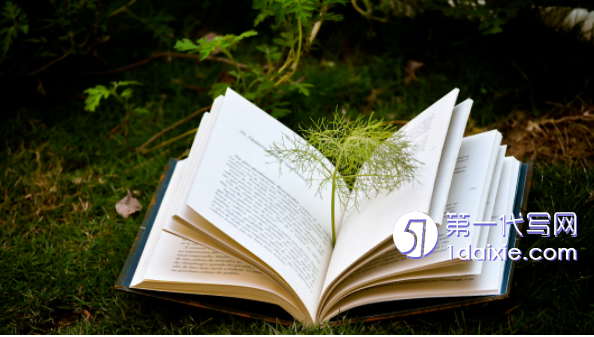本文是一篇英语毕业论文,笔者认为邓嗣禹《颜氏家训》英译本采用深度翻译策略取决于译者主体性、翻译目的和目标读者,同时,汉语特有的语言和文化特性与英语语言文化之间的差异也要求邓嗣禹采用深度翻译策略。
Chapter OneINTRODUCTION
1.1 Research Background,Significance and Aims

Family instructions have a long history in China.It is not only an important part oftraditional Chinese culture,but also a major part of a family or a clan.It has played asignificant role in guiding individuals,families and even the whole society throughoutthe history of China.Chinese family instructions have also received attention fromJapan,Korea and western countries.Effective and wide translation and dissemination ofChinese classics on Chinese family customs and traditions are increasingly important.
Yanshi Jiaxun is not only a family educational guidebook on establishing oneself,governing a family and dealing with the world and learning,but also a cultural book ofthe customs and habits during the Northern and Southern Dynasties of China,which ishighly respected by scholars and has far-reaching influence with considerable literary,cultural,philosophical and historical value.
The first English version of Yanshi Jiaxun,is translated by Teng Ssu-yu(1906-1988)and Lucius Chapin Porter(1880-1958),but for reasons of war and LuciusChapin Porter’s poor health,it was mainly translated by Teng Ssu-yu.Teng Ssu-yucommemorates him at the beginning of the translation and expresses gratitude to him inthe introduction of the translation.This translation was highly appreciated by thewestern scholars.Wang Yitong(1998)commented that“Teng’s translation of YanshiJiaxun sets a precedent of English translation of the classics of the Northern andSouthern Dynasties”(273).
1.2 Research Methods
Taking thick translation as the research perspective,this thesis focuses on theanalysis of the thick translation in Teng Ssu-yu’s translation of Yanshi Jiaxun,from theaspects of explicit thick translation and implicit thick translation first proposed by CaoMinglun(2013:118).Explicit thick translation means“adding notes outside the text”(Cao,2014:114),and implicit thick translation means“adding words inside the text”(Cao,2014:114).Thick translation can better convey the content of the source text byadding relevant information to the translation.The supplementary content is presentedthrough introduction,notes,appendices,etc.And sometimes words or sentences are alsoadded directly to the translation to show logical relationships,metaphorical content andomitted content.The way to add introduction,notes or appendices is explicit thicktranslation and the way to add words or sentences directly and naturally into thetranslation to make the semantic sense complete is implicit thick translation.
Based on the perspective of thick translation,reading relevant literature,andcombining with relevant studies of translation researchers,this thesis mainly adopts themethods of text comparison,case study and literature analysis to study the phenomenonof thick translation in Teng’s translation and explore the reasons why Teng Ssu-yuadopts thick translation strategy.
Chapter TwoLITERATURE REVIEW
2.1 Yanshi Jiaxun and Its English Versions
Yanshi Jiauxn written by Yan Zhitui has had a profound influence on latergenerations with a considerable literary,cultural and historical value.Up to now,thereare three complete English translations of Yanshi Jiaxun,respectively translated by TengSsu-yu(1968),Zong Fuchang(2010)and Tian Xiaofei(2021).
2.1.1 An introduction to Yanshi Jiaxun
Yanshi Jiaxun,composed of twenty chapters,“is predominantly didactic,with onetopic per chapter”(Zong 22).It is also a collection of essays and notes rather than alengthy monograph.This book is written in such a way that the ideas are presented firstand then some stories or facts are given as examples.Although the stories are short,thedescriptions are extremely vivid.The essays in this book often uses metaphors andwonderful folk proverbs,the style of which is much like those of the pre-Qin sages(351-394),but with a more casual approach.The language of Yanshi Jiaxun is simpleand unpretentious.It is neither in the style of the parallel prose of the Six Dynasties(222-589)nor in the style of the ancient texts of the Qin(221 B.C.-207 B.C.)and Han dynasties(202 B.C.-220 B.C.),but in a style close to the spoken language of the time,which is unique in the literary history of the Northern and Southern Dynasties(420-589).“Yanshi Jiaxun is a great work of prose from the Northern Dynasties(420-589),as it isoften written in a satirical style and has a timeless meaning”(S.P.Wang 34).This bookhas a profound influence on later writings on family instructions and the like.
2.2 Study on Yanshi Jiaxun and Its English Versions
At the present time,though the domestic research on Yanshi Jiaxun is mainly focused on Chinese studies and there are also some studies on its English translation.The foreign studies of the English translation of Yanshi Jiaxun are mainly based on TengSsu-yu’s translation,mostly in the form of book reviews and essays.
2.2.1 Study on Yanshi Jiaxun
Domestic research on Yanshi Jiaxun includes a variety of topics and perspectives,and the most common ones include the study on family ideology and moral construction,the study on phonology,vocabulary and syntax of Yanshi Jiaxun,the study on YanZhitui’s thoughts and writing style and the comparative study on family instruction texts.He Yarong and Liu Haixia(2020)analyzes the ideas of building family ethics embeddedin Yanshi Jiaxun.Zhu Yuan and Liu Jinli(2019)focus on the purpose,attitude andmethod of learning in Yanshi Jiaxun,with a view to educating and enlightening youngpeople about learning.Focusing on the analysis of moral education promoted by YanZhitui,Xu He(2022)emphasizes the importance of family education,pointing out thatfamily education should be consistent with school education and that family.ZhangYanguo(2022)explores Yan Zhitui’s thought from the perspective of his turbulent andrich life experience,and believes that the construction of his thought system isimprinted with a deep mark of life and connotation of the times.Zhang Ze(2019)compares and analyzes Yanshi Jiaxun and Zeng Guofan Jiashu.Both of them attachimportance to family education,and there are many similarities in the purpose,contentand methods of family education,but they have different views on the purpose ofreading and the attitude toward learning arts.
Chapter Three THICK TRANSLATION.........................15
3.1 The Origin and Development of Thick Translation.................................15
3.2 Classifications of Thick Translation.....................................16
3.3 The Significance of Thick Translation in Translation of Chinese Classics........17
Chapter Four THICK TRANSLATION IN TENG’S ENGLISH TRANSLATION OFYANSHI JIAXUN.............................20
4.1 Explicit Thick Translation...................................20
4.1.1 Explicit thick translation of peritext...........................21
4.1.1.1 Footnotes.....................................22
4.1.1.2 Parenthetical notes.....................................44
Chapter Five THE REASONS FOR THICK TRANSLATION OF YANSHIJIAXUN.....................................64
5.1 Translator’s Subjectivity...................................64
5.1.1 The academic background of Teng Ssu-yu..........................65
5.1.2 The translation habits of Teng Ssu-yu..........................66
Chapter FiveTHE REASONS FOR THICK TRANSLATION OF YANSHIJIAXUN
5.1 Translator’s Subjectivity
The translator is no longer the servant of the author of the source text and thereader of the target text,but an individual who has his or her own thoughts and cantranslate creatively as long as not violating the original meaning.The translator’ssubjectivity refers to“the translator as the subject of translation to achieve the purposeof translation on the premise of respecting the object of translation”(Cha and Tian 22),and its basic characteristics are“the conscious cultural awareness,humanistic characterand cultural and aesthetic creativity of the subject of translation”(Cha and Tian 22).Asuccessful translation is influenced by many factors,of which the translator should be an important part.
5.1.1 The academic background of Teng Ssu-yu
Teng Ssu-yu’s choice of a scholarly translation was largely determined by his ownstatus as well as by the historical background of the time and the need for practicality.At that time,foreign translations of ancient Chinese cultural canonical texts had longbeen undertaken by western sinologists and missionaries,but due to the differences incultural backgrounds and ways of thinking between China and the west,they inevitablygenerated biases and misunderstandings in the translation process.These inappropriatetranslations and dissemination would ruin China’s international image.In order tocorrect these biases,Chinese historians who stayed in the United States,represented byTeng Ssu-yu and Chen Rongjie,also took up the task of translating classic Chinesehistorical and philosophical works into English,which played a positive role inproactively disseminating Chinese culture and correcting the misunderstandings andbiases of western sinologists and missionaries(Peng,2019:57).After leaving China atan early age,Teng spent more than 50 years in the United States as a sinologyresearcher,and contributed greatly to the promotion of Chinese history and literarymasterpieces to the world.

Chapter SixCONCLUSION
As an ancestral family instructions work,Yanshi Jiaxun is a work of great literary,cultural,philological,and educational value,a true reflection of Yan Zhitui’s lifeexperiences,and an earnest expectation of Yan Zhitui for his descendants.The study onand translation of Yanshi Jiaxun will not only help the present-day family,society andnation to form a good family,social and national ethos,but also promote thedissemination of Chinese family culture in the world.
Teng Ssu-yu’s translation is the earliest English translation of Yanshi Jiaxun,whichis evaluated as the first English translation of a classic text for the Northern andSouthern Dynasties.The successful translation and dissemination of Yanshi Jiaxun isdue not only to Teng Ssu-yu’s rigorous and conscientious attitude to translation,but alsoto the thick translation strategy he employed.His translation combines explicit thicktranslation and implicit thick translation,and provides readers with an information-richnetwork of cultural meanings through numerous footnotes and parenthetical notes,listsof abbreviations,bibliographies,and index,allowing readers to access relevantinformation accurately and quickly under the net,and thus to better grasp the importantconnotations of the source text.This rich historical and cultural information is alsoimportant and valuable for sinologists studying the history and culture of the Northernand Southern Dynasties in China.
reference(omitted)
